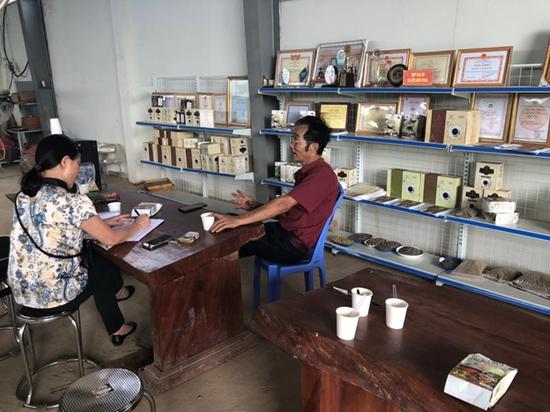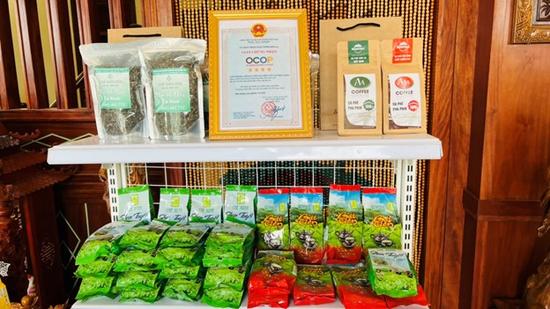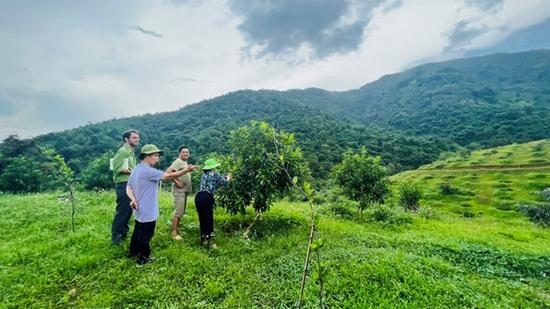E-commerce and agroecological transformations in Dien Bien and Son La Province of Vietnam
Can e-commerce foster the production and distribution of agroecological products? E-commerce is challenging for agricultural products as products cannot be seen directly by buyers and can be damaged during delivery. However, an increasing number of people now sell and buy high quality food products online in Vietnam and local authorities see e-commerce as an opportunity to better connect producers with the market.
From 11 to 17 May 2022, CIRAD and FAVRI researchers went to Dien Bien and Son La provinces to document the potential connections between agroecological production and online sales. They talked with provincial and district officers to learn more about current policies and supports for the e-commerce of local agricultural products. They also conducted interviews and surveys with 30 individuals, cooperatives and companies who are selling agricultural products online. The team mainly targeted online sellers who are trading “agroecological” products in the broad sense of the term – including safe food products (organic, clean, produced under “good agricultural practices”, etc.), high quality products (special varieties, hand-crafted, etc.), regional specialty products, etc. The goal of the survey was to understand how sellers operate e-commerce activities for these agroecological products, to capture how e-commerce supply chains are structured and to collect users’ feedbacks on the tools and channels used. Survey's results will be utilized in future implementation of the project Agroecology and Safe Food System Transitions in Southeast Asia (ASSET Project).
Current situation of e-commerce for agroecological products in Dien Bien and Son la Province
Interviews and surveys results show that e-commerce is a recent form of sales for agricultural products in Dien Bien and Son La (fruits, vegetables, rice, honey, coffee, noodles, dried fruits, dried meat…). Those two provinces already have guidelines and policies to support and promote agri e-commerce for specialty products (especially for OCOP products[1]) on institutional platforms (http://ocop.dienbien.gov.vn/, VoSo, Sendo, Shopee, Lazada, Alibaba…). However, the volume of products sold through those platforms still accounts for a small percentage of online sales. Most sellers favor the use of social media channels, such as Facebook and Zalo[2]. Some interviewees have registered as sellers on e-commerce platforms but the sales volume through this channel is very low. Some also supply wholesalers and distributors who thereafter sell online, in a form of indirect online sales. To increase the volume of sales, big sellers have to pay more fee for advertising campaigns on the platforms. The results of the survey also reveal that women are very active in the e-commerce of agroecological products which should be noted when selecting participants (women) and organizations (Women's Union) for training courses or model designs on the topic of e-commerce for agroecological products in the future.
E-commerce for agroecological products: potential, but challenging
All interviewees identified e-commerce as a very effective way to promote agroecological products. They asserted that selling foods online is an inevitable trend in the future and has great potential. Most of them see e-commerce as an opportunity to diversify their access to markets, in terms of location and segments of population. Online platforms and social media make it possible to access directly to final consumers. As producers and processors set their own price and avoid dependence to middlepersons, they can regain more power and capture higher value-added.
Online channels are also suitable to circulate detailed information regarding food products in terms of quality management practices, food safety issues, potential usages, specific demands, etc. Direct interactions make it possible for sellers and buyers to agree on the quality of the products even though they cannot meet physically. Sellers know more about market demand and buyers can better appraise the products. However, the research team noticed that few information regarding agroecological practices are shared online. While some producers advertise about the “naturalness” of their production processes, few customers ask specific questions regarding farming practices and certifications.
While e-commerce is a good opportunity to open new markets for producers and distributors who already moved towards agroecological practices, direct interaction with customers does not seem to foster cleaner practices nor better quality management. No actor interviewed mentioned that online interactions with buyers pushed them to increase their quality standards. E-commerce of agroecological products seems to benefit mainly middle-scale businesses who are already engaged into a process of quality management and enjoy stable market outlets. E-commerce is an appropriate channel to promote agroecological products and to make them more accessible, but it does not foster agroecological practices as such.
Despite those opportunities, actors reported facing many difficulties due to lack of time and funds to invest and limited knowledge to handle institutional platforms. There are also challenges regarding preservation and delivery, especially for fragile products, small quantities and distant destinations.
To sustain the development of online sales for agroecological products it is necessary to have a comprehensive policy that promotes the development of digital tools and material infrastructures (indirect support), but also a direct support for improving the capacity of sellers to handle the stages of promotion, delivery and customer care, as well as quality management. Food system actors should be better aware of the potential of e-commerce to access new markets where the agroecological qualities of their products are valued at a fair price. Meanwhile, direct interaction between producers and consumers could prompt better quality management and foster agroecological initiatives.
[1] OCOP: One Commune One Product (OCOP) is a Vietnam national programme that seeks to facilitate the development of regional agricultural specialties and rural tourism
[2] Zalo is a popular social media platform in Vietnam
Published: 20/06/2022



